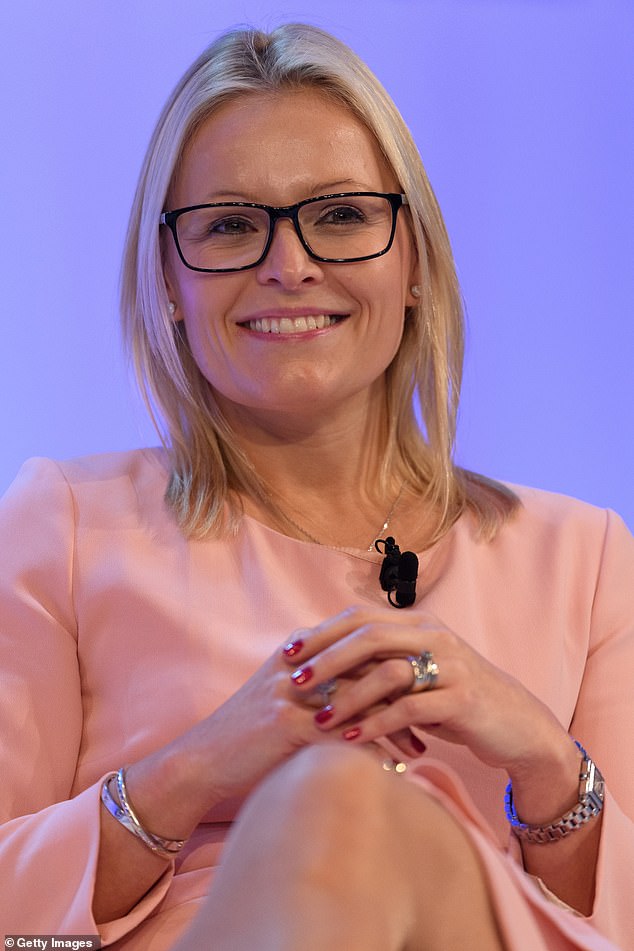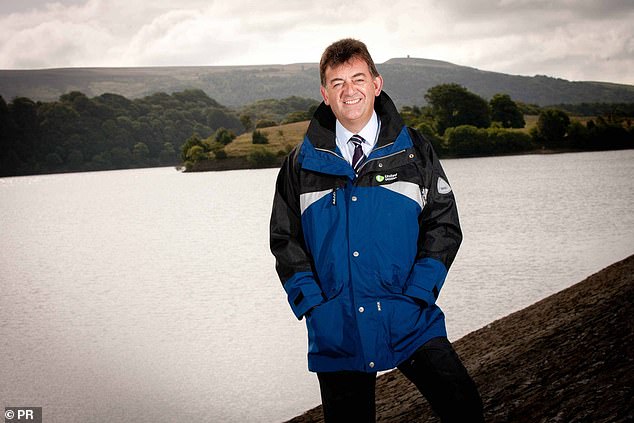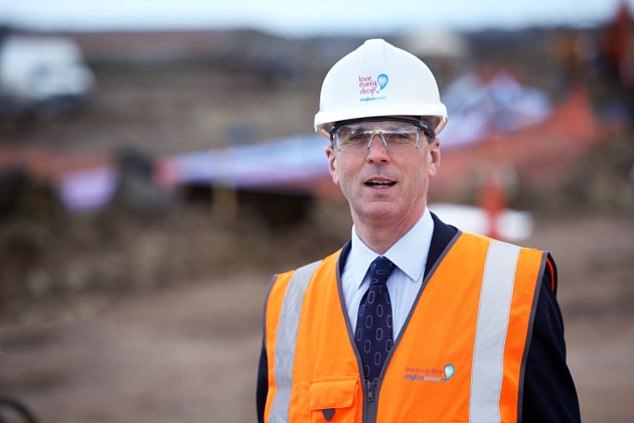Fat cat water company bosses have earned £278m over more than a decade, as hosepipe bans multiply and an independent commission has today called for an overhaul of the privatised industry.
Executive pay figures obtained by the Daily Mail show salaries, pensions, benefits and bonuses earned by 57 chief executives and chief finance officers at Britain’s 11 major water firms over 11 financial years from 2015.
Over a tenth of the overall sum was paid to one CEO alone – Severn Trent’s Liv Garfield, who received nearly £30.9m.
And, of the four water firms which have brought in hosepipe bans after the driest spring in 123 years, Yorkshire Water paid £15m to successive CEOs Richard Flint and Liz Barber.
No executives at struggling Thames Water, which is implementing restrictions in four areas and last week announced losses of £1.65bn in the year to March, made the top 10 of the ‘rich list’, compiled by the Sewage Campaign Network from public annual reports.
This is because of a regular change of bosses through the ‘extremely stressed’ company’s boardroom – but over £26m was paid to 11 different executives.
At Southern Water, which announced a hosepipe ban on Wednesday, nearly £18.7m was paid to eight executives.
Its biggest earner, former boss Ian McAuley, received over £6m. Mr McAuley also received £1.4m while chief executive of South West Water in 2015-16.

Liv Garfield has been the highest-earning water boss over the last 11 years, researchers found
The company’s latest annual report published last week showed it nearly doubled the current chief executive’s pay package last year despite a government ban on bonuses.
Lawrence Gosden received £1.4m – comprising of £691,000 under a “two-year long-term incentive plan” (LTIP), on top of fixed pay of £687,000. The company insisted the extra pay was not a bonus.
The ‘staggering’ figures can be revealed as Environment secretary Steve Reed is to promise ‘root and branch’ reform and replace existing regulator Ofwat, admitting current regulation ‘has failed customers and the environment’.
In his response to today’s Independent Water Commission’s report, Reed is to pledge customers will ‘never again face huge shock hikes’ to their bills after average rises of 25pc last year.
Private water companies, many owned by foreign investors and private equity firms, have come under sustained criticism for performance on leaks and sewage dumping as bills soar. Serious pollution incidents rose by 60pc last year.

Lawrence Gosden, chief executive of Southern Water, whose pay package doubled last year
Prof Becky Malby, of the Sewage Campaign Network, said of the pay figures: ‘It’s unbelievable that a service which is a monopoly industry is creaming off this much for its chief executives and chief financial officers.
‘The outgoing chief executive of the NHS earned £270,000 a year when it is a complex and difficult organisation to run.’
Meanwhile, Lib Dem environment spokesman Tim Farron said: ‘These figures are staggering and people will be rightly furious that these execs are lining their pockets as water bills skyrocket and their companies destroy our local environment with filthy sewage.’
The Sewage Campaign Network’s rich list can be as the Independent Water Commission, headed retired civil servant Sir Jon Cunliffe, published a scathing report, recommending new legislation and tighter regulation but stopping short of taking the industry back into public ownership.
The Sewage Campaign Network – backed by academics and campaigners including Feargal Sharkey – has put together its own ‘People’s Commission’ report into the water industry, calling for measures including renationalisation.
The campaign said Sir Jon’s report ‘fails to deliver an ambitious transformation of water’ and that ‘fundamental problems’ remain.
It said: ‘Privatisation is more expensive than public ownership – debt is much more expensive, servicing overseas financial interests is expensive. Currently 21-53% of our water bills are used to pay off water company debt.’
The campaign added: ‘No amount of restructuring regulation will enable government to manage the water companies’ primary motive which is profit, and financial return to shareholders.’
Last week, it emerged the water industry watchdog warned six firms not to raise directors’ salaries to get around a sweeping bonus ban.
Ofwat said it would be ‘watching closely’ after barring United Utilities, Thames Water, Wessex Water, Anglian Water, Southern Water and Yorkshire Water from making performance-related payouts.
Since they were privatised debt-free in 1989, the utilities have paid out £85 billion in dividends and are now drowning in £60billion of debt, while household bills have almost doubled in real terms.
Customers face hikes of up to 53 per cent before inflation over the next five years to pay for infrastructure repairs.
In a speech in February, Sir Jon said: ‘It would be very difficult to say now that we have a water sector in which the public have trust.’
A Water UK spokesperson, representing the private water firms, said: ‘Executive pay in the water industry is independently determined by remuneration committees, which abide by laws and regulations.
‘Water companies are focused on investing a record £104 billion over the next five years to secure our water supplies, end sewage entering our rivers and seas and support economic growth.’
Who’s who… the highest-earning water bosses as revealed by campaigners

Liv Garfield, chief executive of Severn Trent Water since 2014, who received a total of £30.9m
Liv Garfield, chief executive of Severn Trent Water since 2014, has earned £30.9m since 2015.
The 49-yar-old became the youngest female CEO of a FTSE-100 company when she was appointed to the top job at Severn Trent in 2014, aged 38.
She received a CBE for services to the water industry in 2020 – the same year Environment Agency figures showed the equivalent of 64 years’ worth of raw sewage was dumped into rivers and streams.
Ms Garfield was previously an executive at BT, where we CEO of its Openreach division between 2011 and 2013. In 2013, Fortune Magazine identified her as ‘one of the world’s fastest-rising corporate stars’.

Steve Mogford, chief executive of United Utilities, earned £21.3m over eight years
Steve Mogford, 69, CEO United Utilities 2011-2023, earned £21.3m over eight years between 2015 and 2023.
Mr Mogford was previously a Chief Operating Officer for Programmes at BAE Systems plc, where he worked for 30 years.
He now holds roles including a partial return to defence as a senior independent director of military supplier QinetiQ Group.

Peter Simpson has been chief executive of Anglian Water since 2013 and received £15.8m
Peter Simpson, 58, CEO Anglian Water since 2013, earned £15.8m since 2015.
Mr Simpson worked his way up within the company having been an executive there for the last 21 years, being COO from 2004 and appointed managing director in 2010.
He is a founding member and co-chair of the Prince of Wales’s Corporate Leaders Group in the UK and was a chairman of industry body Water UK in 2012/13.

James Bowling, former chief financial officer of Severn Trent, earned £12m over eight years
James Bowling, 56, CFO Severn Trent 2015 to retirement in 2023, earned £12m since 2015.
Has a background in motoring having spent nine years at Ford. Mr Bowling was then at pharmaceutical company Shire PLC before moving to Severn Trent.

Susan Davy earned £11.1m over 11 years from two executive roles at South West Water
Susan Davy, 56, chief executive South West Water for last five years, previously chief financial officer, earned £11.1m in the two roles.
Ms Davy announced her retirement earlier this month. Details of her earnings come as South West Water is set to be forced to spend £24m under an ‘enforcement package’ imposed by regulator Ofwat, mostly to improve storm overflows to reduce sewage spills.
View the Rich List in full at www.sewagecampaignnetwork.org.uk.












